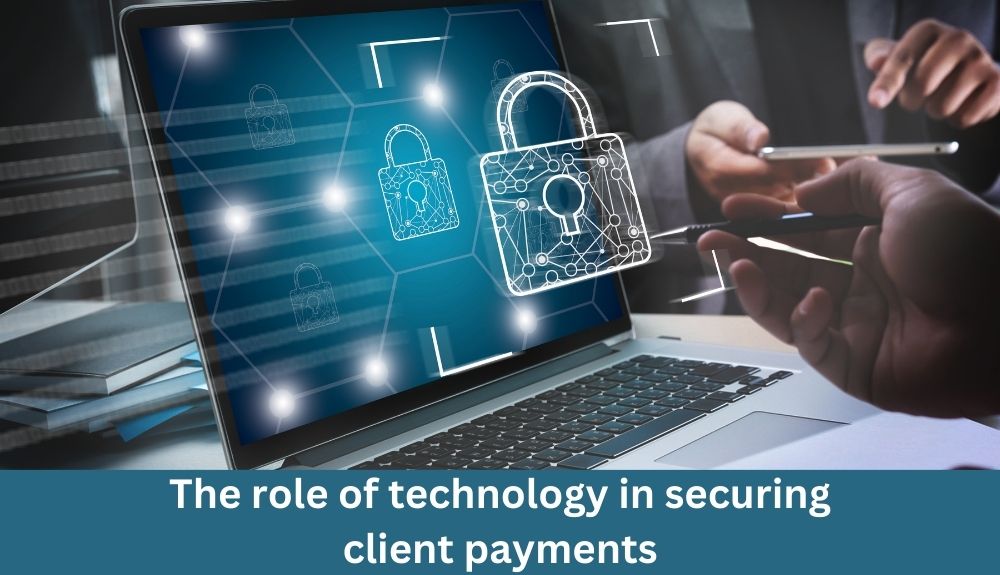
By alphacardprocess February 15, 2024
Introduction to the importance of securing client payments in the contractor industry
Securing Client Payments in the Contractor Industry: Implementing Best Practices and Technologies for Data Protection
Welcome to our blog post where we dive into the crucial topic of securing client payments in the contractor industry. As a contractor, your success hinges on not only delivering exceptional work but also ensuring that you handle client payments securely. In an era where data breaches and fraud are rampant, it’s more important than ever to implement best practices and utilize cutting-edge technologies to protect both your clients’ sensitive information and your own reputation.
Nowadays, contractors have various methods of accepting payment from their clients. Whether it’s through traditional methods like cash or checks, or more modern options such as credit cards or online platforms, each method comes with its own set of risks when it comes to data security. In this article, we’ll explore these different payment methods and discuss strategies for mitigating potential risks.
Data protection is paramount when handling client payments. It goes beyond just safeguarding financial information; it also involves protecting personal details that could be exploited by cybercriminals. We’ll delve into some best practices you can adopt to ensure the highest level of data security for both yourself and your clients.
Technology plays a pivotal role in securing client payments effectively. From encryption software that protects sensitive information during transmission to secure payment gateways that offer robust authentication measures, there are numerous technological solutions available today. We will highlight some key technologies you can leverage to bolster your payment security infrastructure.
As a contractor handling client payments, you must also stay informed about relevant legal considerations surrounding data protection and payment security. Understanding regulations pertaining to privacy laws will help you navigate potential pitfalls while demonstrating your commitment to preserving confidential information.
Taking proactive steps towards securing client payments is not just about compliance – it’s about building trust with your clients and establishing a solid foundation for long-term success in the contractor industry.
So let’s jump right in! Read on as we guide you through implementing best practices and technologies to safeguard client payments in the contractor industry.
Common methods of payment in the industry and potential risks associated with them
One of the most common methods of payment in the contractor industry is through checks. Clients often write out a check for the agreed-upon amount and hand it over to the contractor. While this method may seem straightforward, there are potential risks associated with it.
Checks can be easily lost or misplaced, leading to delays in receiving payments. Additionally, if a check falls into the wrong hands, it could be fraudulently cashed or altered. Contractors must take precautions to ensure that checks are securely handled and deposited promptly to minimize these risks.
Another popular payment method is electronic transfers or online payments. While these can offer convenience and speed, they also pose certain risks. Cybersecurity threats such as hacking and phishing attacks can potentially compromise sensitive client information during online transactions.
To mitigate these risks, contractors should implement best practices for data protection when handling client payments. This includes using secure software systems with encryption capabilities, regularly updating passwords and security protocols, and limiting access to financial information only to authorized personnel.
In addition to best practices, technology plays a crucial role in securing client payments in the contractor industry. Utilizing secure payment gateways or platforms that comply with PCI-DSS (Payment Card Industry Data Security Standard) ensures that clients’ credit card information is encrypted during transmission and storage.
Contractors should also consider implementing two-factor authentication for online payment portals or mobile apps used by clients for making payments. This adds an extra layer of security by requiring users to provide additional verification beyond a password before accessing their accounts.
From a legal standpoint, contractors need to familiarize themselves with regulations surrounding data protection and payment security such as GDPR (General Data Protection Regulation) compliance if dealing with clients from European countries. It’s important not only for ensuring compliance but also building trust among clients who value their privacy rights.
Best practices for data protection when handling client payments
When it comes to handling client payments in the contractor industry, data protection should be a top priority. With the increasing prevalence of cyber threats and identity theft, contractors must implement best practices for safeguarding sensitive payment information.
First and foremost, contractors should ensure that they have a secure payment system in place. This means using reputable third-party payment processors that offer robust encryption and fraud prevention measures. Additionally, contractors should regularly update their software and systems to protect against potential vulnerabilities.
Another important best practice is to limit access to client payment data. Contractors should only grant access to trusted employees who need it for their job responsibilities. Implementing strong password requirements and multi-factor authentication can also help prevent unauthorized access.
Regularly monitoring accounts is crucial for detecting any suspicious activity or signs of potential security breaches. Contractors should review transaction logs on a regular basis and promptly investigate any discrepancies or anomalies.
Educating clients about data protection measures can also go a long way in building trust and ensuring their peace of mind when making payments. Providing clear communication about how their information will be securely handled helps establish transparency and strengthens the professional relationship.
Having proper backups of all client payment data is essential for disaster recovery purposes as well as protecting against potential ransomware attacks or system failures. Regularly backing up this critical information off-site ensures that it can be swiftly restored if needed.
By implementing these best practices for data protection when handling client payments, contractors can significantly reduce the risk of financial loss due to cybercrime while establishing themselves as trustworthy professionals within the industry.
The role of technology in securing client payments

The role of technology in securing client payments cannot be underestimated. In today’s increasingly digital world, contractors must embrace technological advancements to ensure the safety and protection of their clients’ payment information.
One key technology that plays a crucial role in payment security is encryption. By encrypting sensitive data such as credit card numbers or bank account details, contractors can prevent unauthorized access and potential theft. Encryption converts data into an unreadable format that can only be deciphered with the appropriate decryption key, providing an additional layer of security.
Another important aspect is secure online payment gateways. Contractors should choose reputable third-party payment processors that offer robust security measures. These gateways often employ tokenization, which replaces sensitive information with unique tokens for each transaction. This way, even if a breach occurs, the stolen data would be useless to attackers.
Additionally, implementing two-factor authentication (2FA) provides an extra level of protection against unauthorized access to payment systems or client accounts. With 2FA enabled, users must provide not only a password but also an extra piece of information or verification code received on their mobile device before gaining access.
Furthermore, contractors should regularly update their software systems and use antivirus and anti-malware programs to safeguard against potential cyber threats like malware attacks and phishing attempts.
Embracing technology solutions such as encryption, secure online payment gateways, two-factor authentication, and regular system updates are vital steps for contractors looking to protect their clients’ payments from potential risks in our digitally-driven world.
Legal considerations for contractors when it comes to data protection and payment security
When it comes to data protection and payment security in the contractor industry, contractors must be aware of their legal obligations. Failing to comply with these obligations can result in significant financial penalties and damage to a contractor’s reputation.
One key consideration is compliance with applicable privacy laws. Contractors must ensure that they are collecting, storing, and using client payment information in accordance with relevant privacy legislation. This includes obtaining proper consent from clients before collecting any personal or financial information.
Contractors should also implement appropriate security measures to protect client payment data. This may include encryption technology, firewalls, secure payment gateways, and regular system updates to mitigate the risk of unauthorized access or data breaches.
In addition to privacy laws, contractors should be familiar with consumer protection regulations that govern their interactions with clients. These regulations may outline specific requirements for contracts, invoicing practices, dispute resolution mechanisms, and refund policies.
Furthermore, contractors need to stay informed about emerging legal trends and best practices related to data protection. As technology evolves rapidly, so do the legal frameworks surrounding it. Staying proactive will help contractors adapt their processes accordingly while maintaining compliance.
It’s worth noting that legal considerations regarding data protection extend beyond just securing payments; they encompass all aspects of handling sensitive client information throughout the business relationship.
By adhering closely to these legal considerations for data protection and payment security as a contractor operating within the industry framework – you demonstrate professionalism while safeguarding your clients’ trust – an invaluable asset for long-term success!
Conclusion: Taking proactive steps towards securing client payments for long-term success in the contractor
In today’s digital era, securing client payments is of paramount importance in the contractor industry. As contractors handle sensitive financial information on a regular basis, it is crucial to implement best practices and utilize technology for data protection.
By following best practices for data protection when handling client payments, contractors can minimize the risks associated with payment processing. This includes securely storing and transmitting data, regularly updating security measures, and implementing strong access controls.
Technology plays a vital role in securing client payments. Utilizing encryption technologies ensures that sensitive information remains confidential during transmission. Implementing secure payment gateways provides an added layer of protection against unauthorized access.
Contractors should also be aware of legal considerations related to data protection and payment security. Compliance with relevant laws such as the Payment Card Industry Data Security Standard (PCI DSS) helps maintain trust with clients and reduces the risk of legal consequences.
Taking proactive steps towards securing client payments not only protects contractors from potential cyber threats but also builds trust among clients. By prioritizing data protection, contractors can establish a reputation for reliability and professionalism within the industry.
Safeguarding client payments is essential for long-term success in the contractor industry. By implementing best practices for data protection, leveraging technology solutions, and ensuring compliance with relevant regulations, contractors can protect their clients’ financial information while enhancing their own reputation as trustworthy professionals. With these measures in place, contractors can focus on delivering exceptional services without compromising on security or jeopardizing their business growth.